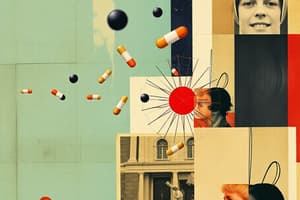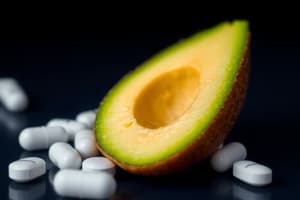Podcast
Questions and Answers
Which process in pharmacokinetics involves the elimination of drugs or their metabolic products from the body?
Which process in pharmacokinetics involves the elimination of drugs or their metabolic products from the body?
- Excretion (correct)
- Absorption
- Distribution
- Metabolism
What aspect of pharmacokinetics focuses on the process by which a drug moves from the site of application to the systemic circulation?
What aspect of pharmacokinetics focuses on the process by which a drug moves from the site of application to the systemic circulation?
- Excretion
- Distribution
- Metabolism
- Absorption (correct)
In pharmacokinetics, what does 'distribution' refer to?
In pharmacokinetics, what does 'distribution' refer to?
- Movement of drugs from site of application to systemic circulation
- Pattern of distribution of drug molecules throughout the body (correct)
- Chemical transformation of a substance into another compound
- Systemic circulation of drugs
Which pharmacokinetic process involves the chemical transformation of a substance into another compound by enzyme catalysis?
Which pharmacokinetic process involves the chemical transformation of a substance into another compound by enzyme catalysis?
What is the main focus of pharmacokinetics in studying the fate of drugs once they enter the body?
What is the main focus of pharmacokinetics in studying the fate of drugs once they enter the body?
Which aspect of pharmacokinetics deals with the pattern of distribution of drug molecules throughout the body?
Which aspect of pharmacokinetics deals with the pattern of distribution of drug molecules throughout the body?
What does bioavailability refer to?
What does bioavailability refer to?
How does bioavailability affect drug efficacy?
How does bioavailability affect drug efficacy?
What can result from drugs that cause selective inhibition or induction of cytochrome P450 enzymes?
What can result from drugs that cause selective inhibition or induction of cytochrome P450 enzymes?
How does personalized medicine differ from traditional medicine?
How does personalized medicine differ from traditional medicine?
Why is pharmacology considered foundational in healthcare practices?
Why is pharmacology considered foundational in healthcare practices?
How do researchers hope to make treatments more effective in personalized medicine?
How do researchers hope to make treatments more effective in personalized medicine?
Flashcards are hidden until you start studying
Study Notes
Pharmacology: Understanding Drug Interactions and Metabolism
Pharmacology is a branch of medicine concerned with drugs, their effects, how they interact with other substances, their mechanisms of action, and optimal usage. It encompasses many aspects of drug therapy, including drug selection, administration routes, dosage forms, formulations, and delivery systems. At its core, pharmacology seeks to describe not only what a drug does, but also why it does it and how it interacts with patients' bodies.
Pharmacodynamics: How Drugs Work
The field of pharmacodynamics studies the mechanisms through which drugs produce their physiological and biochemical responses within the body's cells and tissues. This includes understanding how drugs bind to specific receptor sites in cell membranes or intracellular targets, altering biochemical pathways, and ultimately leading to observable changes in bodily function.
Pharmacokinetics: Drug Absorption, Distribution, Metabolism, and Excretion
Pharmacokinetics focuses on the fate of drugs once they enter the body, specifically studying:
- Absorption: The process by which a drug moves from the site of application to the systemic circulation.
- Distribution: The pattern of distribution of drug molecules throughout the body.
- Metabolism: The chemical transformation of a substance into another compound by enzyme catalysis.
- Excretion: Elimination of drugs or their metabolic products from the body.
Understanding these processes helps clinicians predict potential side effects, determine appropriate dosages, and assess whether certain medications may negatively interact with each other. For example, some drugs can cause selective inhibition or induction of cytochrome P450 enzymes found in the liver, thereby affecting the metabolism of other drugs that share common pathways, potentially resulting in therapeutic failure or unintended toxicity.
Bioavailability
Bioavailability refers to the amount of active drug that reaches systemic circulation after oral ingestion or other routes of administration, relative to the administered dose. Factors influencing bioavailability include absorption rate, gut wall permeability, first-pass effect, plasma protein binding, volume of distribution, transport across cell membranes, and enzymatic degradation.
Personalized Medicine: Tailoring Treatments for Individual Patients
With advances in genomics, proteomics, and clinical trials, personalized medicine aims to deliver pharmaceutical treatments tailored to individual patients based on genetic factors, lifestyle, and medical history. By targeting specific genes associated with disease states, researchers hope to create more effective and safe therapies. An example of this approach is the development of oncologic agents like Herceptin, targeted against HER2-positive breast cancer.
In conclusion, pharmacology serves as the foundation for understanding how drugs work, their interactions, and personalized approaches to treatment. As new discoveries continue to shape our knowledge of medicines and their effects on the human body, pharmacology remains a vital discipline for improving patient care and advancing healthcare practices.
Studying That Suits You
Use AI to generate personalized quizzes and flashcards to suit your learning preferences.




